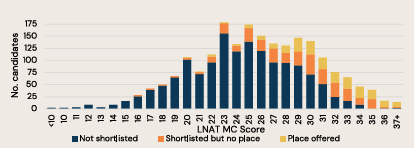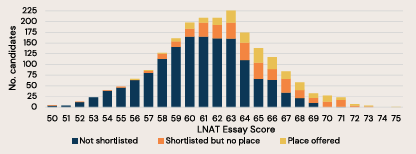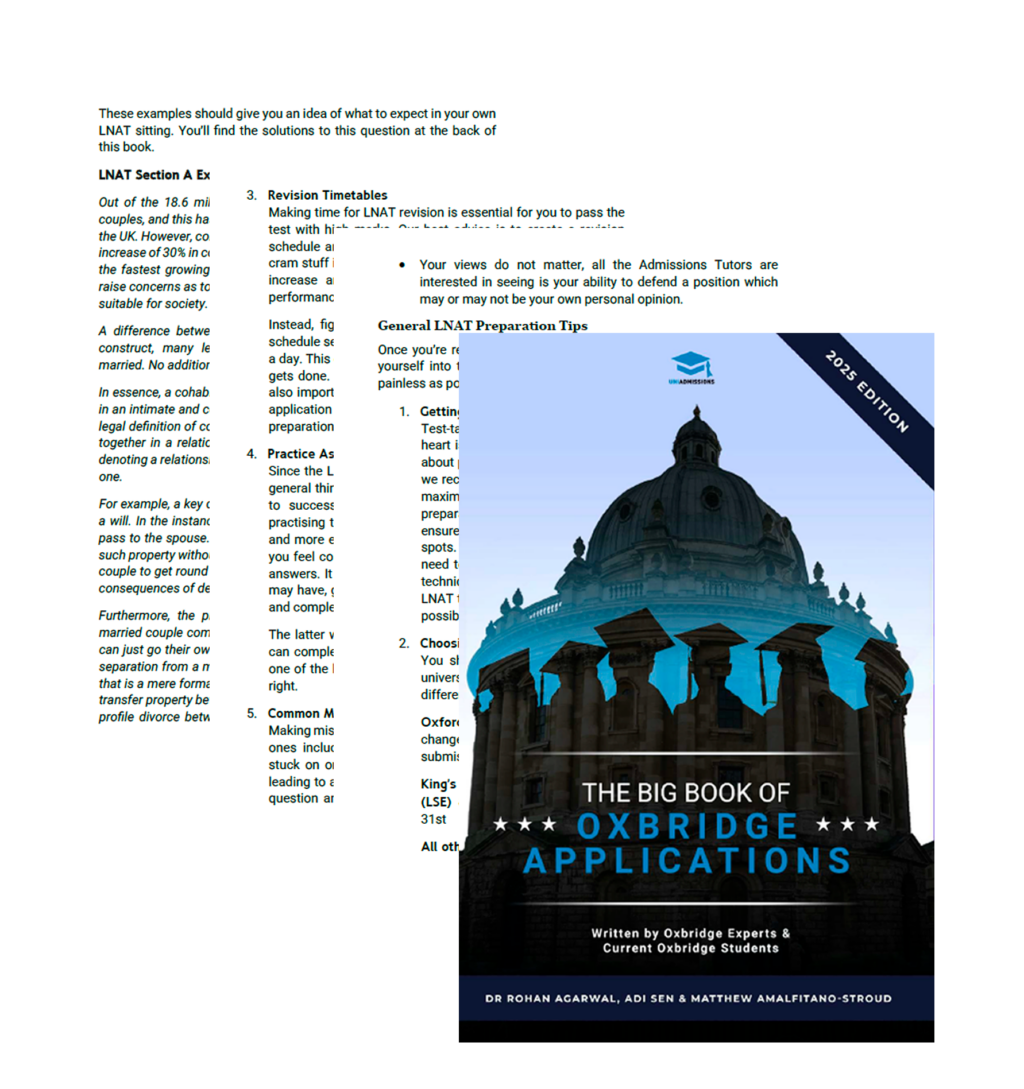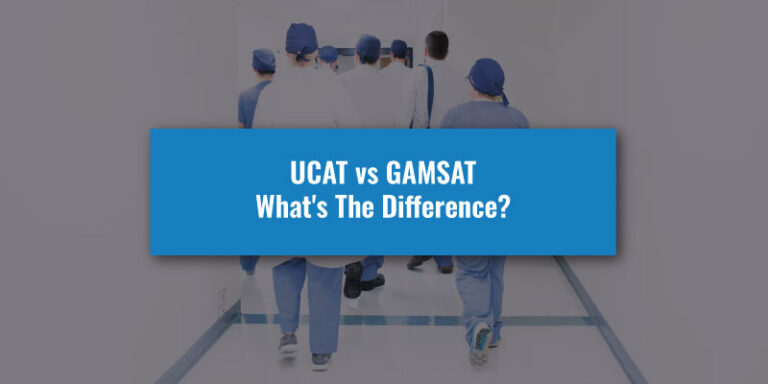If you have sat the Law National Aptitude Test (LNAT), you might be wondering when you will receive your results from it.
For various law schools in the UK, it’s one of the most important parts of the application process, so thousands of applicants each year wait in anticipation to see how they did. But when do the LNAT results come out, and how do the different universities use them during the admissions process? This guide will explain everything you need to know about your LNAT results.
Short on time? Here’s a summary of the guide:
- LNAT results will be sent to you on different dates depending on when you take the test. You may need to wait anywhere from a few days to a few months.
- The LNAT can't be failed but some universities that use the test will set minimum scores that you will need to achieve to be considered.
- Most law schools published the results of their applicants each year, which can help you understand what score you should be aiming for to stand a good chance of getting in.
- Different law schools will place different weighting on the LNAT, as each one has different admissions standards and application processes.
How Is The LNAT Scored?
As you likely already know, the LNAT is split into two sections: a multiple-choice quiz and an essay writing task. As these are two very different styles of questions, the marking scheme for each is different.
Section A of the the LNAT contains 42 questions overall, so this section is marked out of a score of 42, with no form of conversion used. There is no negative marking in this section, meaning you won’t lose marks by getting questions wrong. There also isn’t a set pass or fail mark, so it is down to each university to decide if a cut-off score is set.
Unlike Section A, Section B doesn’t have a set mark scheme used across all universities. As the section involves writing an essay, it is far more difficult to calculate a score based on the output of applications. However, some universities have found methods of assigning scores to essays, while others will just review your work in a more subjective manner.
When Do LNAT Results Come Out?
LNAT results are emailed to candidates twice a year, with test dates determining the results date.
For all Admissions Tests taken before 20th October, the universities that require the LNAT will receive the result directly from the test provider on the 21st October. On any day after 20th October, your test result will be sent directly to the LNAT universities within 24 hours of you taking the test.
- Candidates taking the LNAT on or before 26th January will receive their results in mid-February.
- Candidates taking the test after 26th January will receive their results in mid-August.
Candidates may only sit the LNAT once between 1st September and 31st July the following year, unless authorised to because of extenuating circumstances. If a candidate sits the test twice without authorisation, their later test sitting will be invalid.
Effective LNAT preparation is crucial to achieving an offer, so let UniAdmissions help you get a great score.
The LNAT is a tough exam to prepare for without expert guidance and comprehensive resources. However, our Law Full-Blue Programme provides you with everything you need to perfect your LNAT skills, as well as every other part of the Law application process.
Discover our Law Full-Blue Programme for comprehensive admissions support by booking a free consultation session or clicking the button below to enrol and triple your chances of success.
What If I Fail The LNAT?
Technically, you cannot fail the LNAT although your results are important. You simply achieve a certain number of points in the test, and then the results of your LNAT are considered alongside your qualifications and your Personal Statement.
There is no fixed threshold to define good and bad LNAT results, so you simply have to wait to hear from the LNAT universities you have applied to.
Remember, if you do get a low score it is not the end of the world. While you may not get a place at your preferred university, you can look at other options such as non-LNAT universities or deferring entry to the following year.
LNAT Results 2024
Below you will find the average results for applicants at each of the ten LNAT universities in the UK.
University of Bristol LNAT Results 2022
Currently, the most recent LNAT data from the University of Bristol comes from the 2022 admissions cycle. In 2022 (for 2023 Entry), successful applicants at the University of Bristol scored an average of 25 points in Section A and 82/100 in Section B. This is up from the average scores of 23 for Section A and 39 for Section B in 2021.
University of Cambridge LNAT Results 2024
Below are the average scores for the the 2023 applicant cohort at the University of Cambridge (for 2024 Entry):
Cambridge Section A Average Results
All Applicants – 25.9
Offer holders- 30.1
Cambridge Section B Average Results
All Applicants – 5.5
Offer holders- 7.7
As you can see, the standards for the applicant pool at Cambridge are fairly high overall, but even higher for offer holders, who generally earned 5 points more than the full cohort in Section A.
Based on the data provided by the university, we know that the lowest-scoring applicant in 2024 achieved 10 marks, while the lowest-scoring offer holders achieved 19. The highest score achieved by an applicant was 39.
Section B of the test is scored out of 10 points at Cambridge. We can see that successful applicants scored over 2 points more on average, with every college admitting at least one applicant who achieved full marks. The full data set (broken down by college) can be found here.
Durham University LNAT Results 2023
In 2022 (for 2023 entry), applicants for the University of Durham achieved an average score of 23.9, while offer holders achieved 26.0. These results are both up from the previous year, where applicants achieved 21.8 and offer holders achieved 24.0. This is the most recent data available from the university.
University of Glasgow LNAT Results 2023
The most recent LNAT data from the University of Glasgow comes from the 2022/23 admissions cycle. From this data, we can see the following about Section A:
Glasgow LLB Applicant LNAT Results
Highest Scores – 18 (25th Percentile), 27 (50th Percentile), 37 (75th Percentile)
Lowest Scores – 5 (25th Percentile), 18 (50th Percentile), 27 (75th Percentile)
Mean Scores – 14 (25th Percentile), 22 (50th Percentile), 29 (75th Percentile)
Median Scores – 15 (25th Percentile), 22 (50th Percetile), 29 (75th Percentile)
Glasgow LLB Offer Holder LNAT Results
Highest Scores – 19 (25th Percentile), 27 (50th Percentile), 35 (75th Percentile)
Lowest Scores – 5 (25th Percentile), 19 (50th Percentile), 30 (75th Percentile)
Mean Scores – 16 (25th Percentile), 23 (50th Percentile), 29 (75th Percentile)
Median Scores – 16 (25th Percentile), 23 (50th Percetile), 29 (75th Percentile)
King's College London LNAT Results 2024
King’s College London provides a variety of different Law courses, each of which uses the LNAT in its application process. For the standard M100 Law degree, King’s College London published the LNAT Section A results of all successful applicants in the 2023/24 admissions cycle. From this group, we can see that the lowest achieved score was just 6, while the highest was 37 (achieved by seven applicants). The overall average score of the offer holders was 29.9.
London School of Economics (LSE) LNAT Results 2024
For the 2023/24 admissions cycle, LSE has published data relating to offer holders on its LLB course. From this data, we can see that the average score among successful applicants was 26.4. The highest achieved score was 38, while the lowest was 18. This data does include those with contextual offers, which may explain why the average score is lower than some of the other G5 Universities that require the LNAT.
University of Nottingham LNAT Results 2022
The most recent data published by the University of Nottingham is from the 2021/22 admissions cycle. The only information provided states that the average score for offer holders was 23.18, much lower than most other LNAT universities.
University of Oxford LNAT Results 2024
Oxford Section A LNAT Results
Mean Score (All Applicants) – 25.7
Mean Score (Shortlisted Applicants) – 29.5
Mean Score (Offer holders)- 31.0
Oxford Section B LNAT Results
Mean Score (All Applicants) – 61.8
Mean Score (Shortlisted Applicants) – 64.4
Mean Score (Offer holders)- 64.9
From this data, we can see a clear trend of when applicants begin to be shortlisted and earn offers. Beyond the mean score, we can also see that the modal scores for each section were 23 and 63, respectively. This is also the point where interviews and, in the case of Section B, offers become more common.
However, we can also see that achieving a high score doesn’t guarantee anyone an offer or even an interview, as at least one Section A top-scoring applicant was not shortlisted. However, in Section A, applicants who scored 32 or higher were more likely to get an interview than not, so aiming for a score in this range would be ideal.
UCL LNAT Results 2023
UCL Offer Holder LNAT Results 2023
Section A: 27.4
Section B: 3.4
UCL Offer Holder LNAT Results 2022
Section A: 27.2
Section B: 3.4
UCL Offer Holder LNAT Results 2021
Section A: 27.9
Section B: 3.6
UCL Offer Holder LNAT Results 2020
Section A: 29.3
Section B: 3.8
As we can see, results for both sections have been gradually going down since 2020, although 2023 saw a minor improvement in Section A.
Worried About the LNAT? Let The Big Book of Oxbridge Applications Be Your Guide
- A clear breakdown of what the LNAT involves
- Up-to-date information on test dates and format
- Targeted preparation strategies to help you study efficiently
- Practice questions that reflect the real test
How Do The LNAT Universities Use My Results?
Since the scores expected vary between universities, a good LNAT score for Oxford is generally different from a good LNAT score for Nottingham for example. As a result, it is important to understand how the different universities use your score.
Your LNAT score and essay will be used by each university in the way that best suits its own admissions system. The use of the essay Section B is dependent on each participating university’s admissions policy.
Some universities may use it as the basis for Interview questions. Others may compare it with the Personal Statement, or use it as a means of distinguishing between borderline candidates.
University of Bristol
At the University of Bristol, candidates are scored and ranked based on their academic record, according to their achieved or predicted results with the following weightings:
GCSE 20% | A-Level 40% | LNAT 40%
The overall LNAT grade used by the university uses the following weightings:
60% multiple-choice questions and 40% essay.
The University of Bristol looks for candidates who can demonstrate the ability to make and sustain a persuasive argument and have a strong command of language in the essay section.
University of Cambridge
The University of Cambridge considers both Sections 1 and 2 and requires applicants to complete the test by October 15th, which is in line with the Oxbridge UCAS application deadline.
Durham University
At Durham Law School, performance in the LNAT is one of a number of grounds on which admissions selectors determine the relative merit and potential applicants. As a part of this process, performance in the LNAT may be used to distinguish between otherwise similar candidates.
It is important to note the following:
- Both parts of the LNAT are always considered by Admissions Tutors when assessing an application.
- No minimum score is required for the multiple-choice part of the LNAT.
In Durham’s assessment of an LNAT essay, Admissions Tutors look in particular for evidence of the following positive attributes:
- Focus on the particular question
- Clarity of expression and fluency of prose
- A logical progression and structure
- Reference(s) to relevant evidence
- An ability to recognise, and address, counter-arguments
- A concise and effective conclusion
University of Glasgow
The University of Glasgow is probably the least competitive when it comes to the LNAT. On average, a successful candidate will score 23 out of 42.
The essay is viewed as an add-on to your Personal Statement, with the Admissions Tutor assessing the writing ability of the applicant.
King's College London
KCL strongly encourages applicants to sit the LNAT by mid-December to best facilitate the assessment of their application.
KCL only assesses Section A of the LNAT, with offer-holders tending to score around 26.
This is quite a fair amount above the usual national average but it tends to be slightly less than other London Law Schools such as LSE and UCL. This reflects the fact that KCL tends to rank slightly lower than LSE and UCL in the Law School rankings.
London School of Economics
At present, LSE only uses the multiple-choice score in their assessment of applicants; for most applicants, the essay will not be considered.
However, they might assess the essay for applicants taking non-traditional qualifications or less well-known qualifications.
There is no set minimum score in the multiple-choice section that applicants are expected to achieve in order to be successful, instead, the score may be used to help distinguish between similarly qualified applicants.
University of Nottingham
Uniquely, the University of Nottingham considers an LNAT cut-off score. Whilst information is not precise and changes every year based on the performance of the cohort you should consider the score to be about 25.
The essay is taken into account as well. The criteria are qualitative and the tutors are primarily looking for a candidate to prove their ability to present a logical argument and observe structural conventions of English essay writing.
University of Oxford
As Oxford admissions are centred on the Interview performance, half of the job is getting to the Interview in the first place. For this, the LNAT is crucial.
The average score of a successful candidate in previous years was about 29. Furthermore, only 2% of applicants scored above 34. This indicates that you should be aiming for 30 or above.
However, due to the high calibre of candidates, the scores have a very narrow window. Therefore, the essay is taken very seriously and is assessed through an official marking scheme.
High scoring essays will normally exhibit:
- Application
Close attention to the question(s) asked and sustained and focussed treatment of the issues. - Reasoning ability
Well-drawn distinctions, a keen eye for relevance, awareness of more than one possible line of argument, and an element of independent critical judgment. - Communication
Clear and fluent writing and notable clarity and appropriateness of structure and argument.
Low scoring essays will normally exhibit:
- Application
Poor attention to the question(s) asked, no sustained and focussed treatment of the issues. - Reasoning ability
Poorly developed arguments, a preponderance of irrelevant points, few or no well-drawn distinctions, a lack of awareness of more than one possible line of argument, no evidence of independent critical judgment. - Communication
Lack of fluency and clarity and no clear or appropriate structure or argument.
The essay is to be marked as a percentage and tutors marking the test are asked to mark by analogy to the conventional understanding of marks in examinations. For example, it will only be in the rarest of cases that a candidate would obtain a mark of 75 or above.
SOAS
Applicants with standard qualifications (such as A-Levels, International Baccalaureate or other high school qualifications considered equivalent to A-Levels) are not required to take the LNAT.
However, SOAS will consider making lower offers to candidates who do so and perform well in the Admissions Test.
Usually, a minimum score of 25 and a strong essay is what SOAS consider to be a high-performing candidate.
University College London
The LNAT essay is given considerable weight in UCL’s consideration as it is the only piece of writing they receive under exam conditions, and demonstrates a candidate’s abilities to reason, argue and construct a cohesive essay.
When assessing the essay, Admissions Tutors will consider:
- Aptitude for reasoning skills
Including high-level comprehension, interpretation, analysis, synthesis, ability to draw broad and fine distinctions, induction and deduction - Aptitude for exploring arguments and ideas
Including in writing, the ability to formulate, develop and defend an argument - Communication
Including accuracy of syntax, breadth of vocabulary and ability to formulate ideas succinctly
As for the multiple-choice section:
- On average, a successful home candidate presented a score of about 28.
- On average, a successful international candidate presented a score of about 30.
Looking to boost your LNAT score? Our Law Full-Blue Programme can boost your whole application.
Applying to study Law is immensely competitive, and you must give yourself the best chance of success in every part of the application process. UniAdmissions helps you craft the perfect Personal Statement, achieve a highly competitive LNAT score and teach you how to Interview effectively – covering all areas of your Oxbridge application.
Discover our Law Full-Blue Programme today by booking a free consultation session or clicking the button below to learn how you can enrol and triple your Chances of Success.










